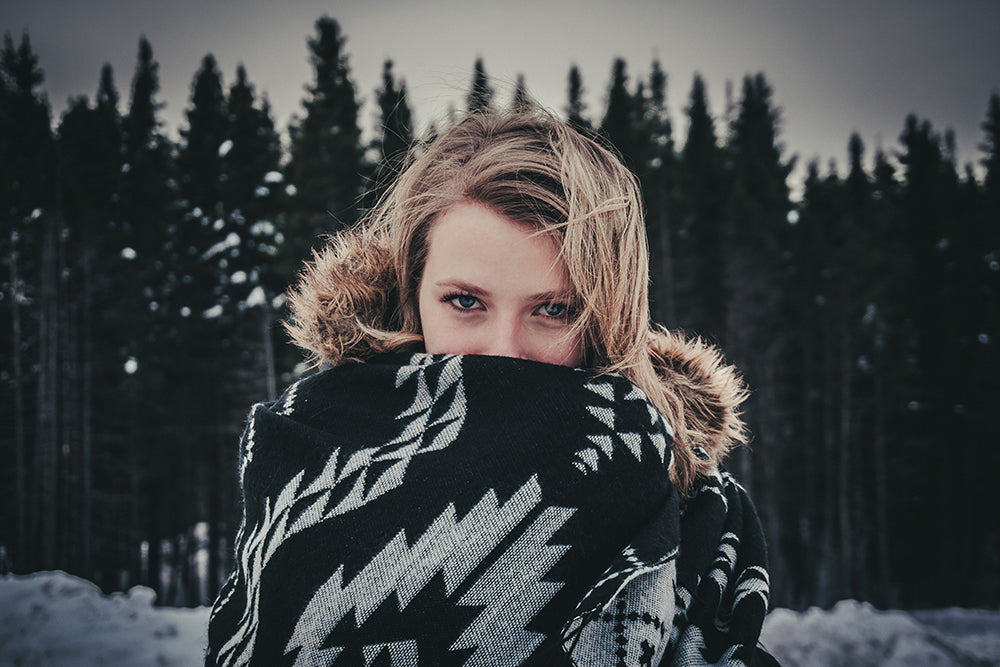Sensitive skin is thought to be to a deficiency in skin’s barrier function (its outermost layer) and oversensitivity of the nerve endings which start to fire off pain signals in response to harmless stimuli. It is not known exactly why this occurs, but what is known is that these symptoms can be brought on by multiple internal and external trigger factors. If you suffer from sensitive or reactive skin it’s a good idea to make a note when any of these stimuli trigger your skin, so you can avoid them in the future.
Internal Triggers:
Hormonal changes
Many women find their sensitive skin changes throughout their cycle or at the start of the perimenopausal stage. Hormonal changes are particularly likely to worsen flushing and redness of the skin.
How to prevent: Ensure your skincare routine is gentle and designed to calm redness. You can also carry a facial mist with you to help refresh on the go and spritz when needed.
Alcohol
If you suffer from sensitive skin you probably saw this one coming. Alcohol causes dilation of the blood vessels in the skin, resulting in flushing and redness. Alcohol also acts as a diuretic which dries your skin out, therefore, making it more vulnerable to external attacks.
How to prevent: Everything in moderation. Limit your alcohol consumption to around 2 units of alcohol per day (roughly 1 medium-sized glass of wine).

Food intolerance
Skin redness, flushing and in extreme cases blistering and rashes can be a sign of a specific food intolerance. Skin diseases such as psoriasis have shown an improvement on a gluten-free diet. Whilst being said, gluten is not a common cause of sensitive skin but it is worth considering.
How to prevent: Keep a food journal and track if your skin changes with certain foods you eat – if you notice a pattern, contact your general practitioner or a nutritionist for more information of your next steps.
Spicy food
Not just food intolerances, spicy foods can notice their skin flushes or reddens after eating spice. There’s a substance called capsaicin in spicy food that can trigger irritation receptors in the skin, leading to redness.
How to prevent: Avoid spicy foods, opt for milder dishes instead.
Stress
We all know that stress can play a part in our skin health, arguably even more so if you have sensitive skin. When you are flustered, anxious or embarrassed the nerve endings in your skin start to fire pain signals causing blood vessels in the face and neck to dilate.
How to prevent: Whilst you can’t control your reactions to your skin, you can control your reaction to stress. If you notice you become flustered in high-stress situations engage in some mindfulness practices at home so when a situation arises you can use these techniques to help lower stress levels. Here's a great three-minute practice to try.

External Triggers:
Pollution
Pollution affects everyone, but those with sensitive skin will feel this more. Fine particles called PM 2.5 (basically soot) stick to the skin’s surface and they trigger a chain reaction of oxidative stress causing irritation. This causes damage to the protective barrier of the skin, causing dryness and increases skin’s sensitivity.
How to prevent: A little tricky if you live in a big city, but not impossible. Ensure you’re removing all makeup, grime, daily wear at the end of your day. You could also leave a cleanser at work to wipe away any pollution you’ve encountered on your commute.
Laundry soap and sensitive skin
“Biological” laundry detergents contain enzymes that can irritate the skin, while others are simply too concentrated in irritants like sodium lauryl sulphate that strip skin of its defences.
How to prevent: Opt for non-biological washing powders and use only the amount suggested. You can also give the clothes an extra rinse cycle to remove the last traces od detergent.
Temperature changes & wind
Sharp temperature changes can trigger the release of histamine in the skin – this can cause itching, prickling sensations and causes the blood vessels to dilate resulting in redness.
How to prevent: You can’t change the weather, but you can avoid taking long hot showers or baths, and try turning down the central heating in winter and the air con in summer. Also when you go outside in wind chill use a scarf and protect your face as much as possible.

Sun – UVA/UVB
Not just a beauty enemy causing premature aging. The UV rays in sunlight trigger oxidative stress and inflammation in the skin, which can lead to sensitive skin.
How to prevent: You probably hear this one every summer. Stay out of the hottest part of the day (11am-3pm). Wear mineral sunscreen (although, this should be worn every day!) mineral sunscreens are gentler on the skin and are less likely to cause irritation.
Additives in cosmetics
Unfortunately, several years ago manufacturers realised how they could create cosmetics on a greater scale for a lower cost, which means many cosmetics are not created with sensitive skin in mind. Certain ingredients can trigger the symptoms of sensitive skin such as soaps and harsh cleansers which strip your skin’s protective barrier, leaving it vulnerable to attack from environmental irritants.
How to prevent: Stay away from colourants, fragrances, alcohol, lanolin and harsh acids like AHA (alpha-hydroxy acids) or skin irritants like retinol.
When it comes to sensitive skin, less is more.
Contact us via email, over the phone (1.855.495.4958) or pop into our stores to learn more about our new Sensitive Skin Range – designed to allow the skin to breathe providing pure, gentle relief to help your skin look and feel its best.



